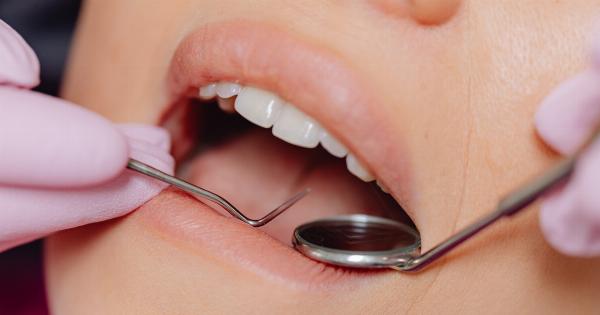Gum finger health is an essential aspect of overall oral health. Many people often neglect their gum health, assuming it’s not as crucial as teeth health.
However, unhealthy gums can lead to severe dental problems like gum disease, tooth loss, and even systemic health issues. It’s important to understand the potential concerns related to gum health to ensure proper care and prevent any long-term complications.
1. Gum Disease
Gum disease, also known as periodontal disease, is a prevalent concern that affects the gums and supporting tissues of the teeth.
It usually occurs due to poor oral hygiene habits, where plaque and tartar buildup irritate the gums, leading to inflammation and infection.
Early stages of gum disease, known as gingivitis, may manifest as swollen, red, and bleeding gums. If left untreated, it can progress to periodontitis, causing irreversible damage to the gum tissue and bone supporting the teeth.
This can ultimately lead to tooth loss.
2. Gum Recession
Gum recession refers to the process in which the gum tissue surrounding the teeth wears away or pulls back, exposing the tooth root.
It can occur due to multiple factors, including aggressive tooth brushing, gum disease, hormonal changes, and genetic predisposition.
Receding gums not only affect the aesthetic appearance of your smile but also increase the risk of tooth sensitivity and tooth decay. Exposed tooth roots are more susceptible to damage and decay, leading to potential tooth loss.
3. Gum Infections
Gum infections can occur when harmful bacteria enter the gum pockets and multiply. These infections may result in the formation of pus-filled abscesses, which can be extremely painful and cause swelling in the affected area.
Common symptoms of gum infections include pain, tenderness, redness, and a foul taste in the mouth. If left untreated, gum infections can spread to the surrounding tissues and even into the bloodstream, posing a risk to overall health.
4. Gum Erosion
Gum erosion is a gradual process where the gum tissue thins or wears away, leading to exposure of the tooth roots.
It can occur due to factors such as aggressive brushing, teeth grinding, acidic foods, certain medications, and a lack of saliva production.
As the gum line recedes, teeth may appear elongated and become more sensitive to hot, cold, and sweet stimuli. Gum erosion can also increase the risk of dental cavities and compromise the stability of the teeth.
5. Gum Hyperplasia
Gum hyperplasia, also known as gingival overgrowth, is a condition characterized by the excessive growth of gum tissue. It can be a side effect of certain medications, such as anticonvulsants and immunosuppressants.
Hyperplastic gums can create an unbalanced or gummy smile, making oral hygiene practices more challenging. The overgrown gum tissue can also harbor bacteria and plaque, leading to gum inflammation and potential gum disease.
6. Gum Pain and Sensitivity
Healthy gums should not cause any pain or discomfort. However, if you experience gum pain or sensitivity, it may indicate an underlying issue.
Common causes of gum pain and sensitivity include gum disease, tooth infections, abscesses, gum recession, and trauma to the gum tissue.
Ignoring gum pain and sensitivity can worsen the problem and potentially lead to more severe oral health issues. It’s essential to consult a dental professional to diagnose and treat the underlying cause of the discomfort.
7. Gum Bleeding
Bleeding gums during brushing, flossing, or eating are not normal and should not be ignored. It is often an early sign of gingivitis or gum disease.
When plaque and tartar accumulate along the gum line, it irritates the gum tissue, causing inflammation and bleeding.
If you notice persistent gum bleeding, it’s crucial to seek dental attention. Early intervention can prevent the progression of gum disease and its associated complications.
8. Gum Sensitivity to Changes
If you notice that your gums are sensitive and react strongly to changes like temperature or touch, it could indicate gum health concerns. Healthy gums generally tolerate normal changes in the oral environment without discomfort.
Gum sensitivity to changes may be an early warning sign of gum disease, gum recession, or dental infections. It’s important to pay attention to such symptoms and seek professional advice for proper diagnosis and treatment.
9. Gum Health and Systemic Health Link
Research continues to highlight the relationship between gum health and overall systemic health.
Several studies have shown associations between gum disease and various conditions like cardiovascular disease, diabetes, respiratory infections, and adverse pregnancy outcomes.
Poor gum health can contribute to systemic inflammation, which may impact overall health. It’s crucial to maintain good gum health as a part of a holistic approach to well-being.
10. Maintaining Healthy Gums
Preventing gum health concerns involves adopting proper oral hygiene practices and seeking regular dental care. Here are some tips to maintain healthy gums:.
- Brush your teeth properly at least twice a day using a soft-bristle toothbrush and fluoride toothpaste.
- Floss daily to remove plaque and food particles from between the teeth and along the gumline.
- Use an antimicrobial mouthwash to help control plaque and reduce bacteria in the mouth.
- Avoid smoking and tobacco use, as it increases the risk of gum disease.
- Maintain a balanced diet rich in fruits, vegetables, and whole grains for essential nutrients that support gum health.
- Avoid sugary and acidic foods that can contribute to tooth decay and gum erosion.
- Manage stress, as it can weaken the immune system and increase the risk of gum disease.
- Visit your dentist regularly for professional cleanings, examinations, and early detection of any potential gum problems.
Conclusion
Healthy gums are vital for maintaining optimal oral health and preventing potential dental and systemic health complications.
By understanding and addressing the various gum health concerns discussed above, individuals can take proactive measures to care for their gums and ensure a healthy smile for life.


























